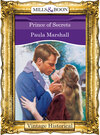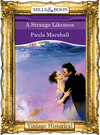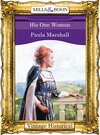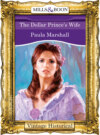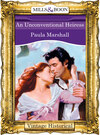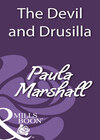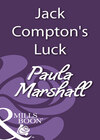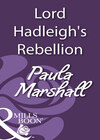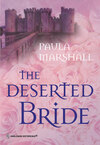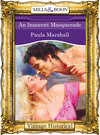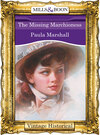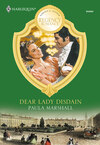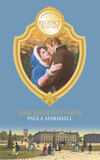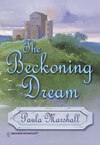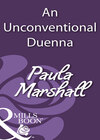Читать книгу: «Prince Of Secrets», страница 3
‘Of course.’
Violet bit into a cucumber sandwich, and said carelessly, ‘I never really supposed that Apollo would be faithful to you after the first flush of marriage was over, but I didn’t think that he would go a-roving so soon, and quite so near home.’
Dinah’s hands, hovering over the silver teapot—she had been about to pour them both a second cup—stilled. She dropped them into her lap and said tonelessly, ‘I really don’t know what you are trying to tell me, Violet. It might be better if you spoke plainly, then I would not be able to misunderstand you.’
‘Oh, I wouldn’t want you to misunderstand me,’ drawled Violet poisonously, ‘I thought to spare you a little, but since you wish to bite the bullet, do so by all means. The gossip—and I am astonished that you have not heard it—is that Susanna Winthrop is pregnant, that the father of the child cannot be her husband, and to put it plainly—as you wished—the father happens to be your husband.’
All that Dinah could hear was the relentless ticking of the clock, and something inside her which said, Is that what has been exercising him all this time? An affair with Susanna?
Aloud she said, pleased that the Marquise’s training appeared to be able to allow her to withstand this appalling news—supposing that it was the truth—‘Now that I do not believe, Violet. It is my understanding that she has been having an affaire with Sir Ratcliffe Heneage, and that Cobie has been troubled over it. He hinted as much to me.’
‘Oh, you poor dear innocent!’ Violet put down her cup and leaned forward commiseratingly. ‘It’s all a blind, can’t you see? I have every reason to know that Sir Ratcliffe’s interest in Susanna Winthrop has been quite innocent, and that she and Apollo have been using it to disguise their own activities. Besides, I am reliably informed that they have been lovers for years, despite the difference in their ages.’
Could this possibly be true? thought Dinah numbly. Or was it merely Violet being spiteful? Surely Cobie wouldn’t betray her with his foster-sister—and so soon? She thought of their happy days and nights together, but she also thought of what he had said to her more than once, ‘You are not to love me, Dinah.’
Was he saying that in order to allow himself to be unfaithful? She felt her throat close. She wanted to scream at Violet, to shriek at her, to…
Instead she said calmly, ‘What nonsense, Violet. I am not foolish enough to expect my husband to be permanently faithful to me. That, I have come to understand, is the way of the world. It puts a different complexion on Mother’s behaviour, doesn’t it? Besides, I don’t believe he would do this to me so soon after our marriage.’
‘But what did he marry you for?’ asked Violet triumphantly. ‘Not for love, of that I am sure. And having got you, and turned you from a timid little mouse into someone half-way presentable, what on earth is there to keep him faithful, tell me that?’
‘Could we drop this as a subject for discussion, Violet?’ Dinah was proud of the steadiness of her voice. ‘Since it is mere speculation on both our parts, it is all rather pointless.’
‘Well, if you wish, but you did say that you wanted me to speak plainly—which I have done.’
‘And I have listened to you. Now, would you like some more tea, and perhaps you could advise me on what to take to Yorkshire. I am afraid my Parisian teacher didn’t include that in her training.’
‘The Marquise de Cheverney, wasn’t it?’ Violet seemed determined to be as poisonous as she could. ‘Another of his mistresses, one supposes. Really darling, you were hardly the person to be plunged headfirst into such a galère!’
‘Perhaps you might like to describe the kind of person who would be fit for it,’ retorted Dinah glacially, ‘I doubt whether Cobie would have wished to marry her!’
Violet inclined her head graciously. ‘There is that. I suppose that naïveté would be more his style. No competition for him, no need to worry that you are erring off the straight and narrow. Not yet, any way.’
Dinah would have liked to throw her tea straight into Violet’s smiling face. Her new self-control precluded any such thing. ‘Are you suggesting that I follow your way of life, Violet? Would you care for me to compete with you for the Prince’s favours? You once hinted that he might like charming innocence. Shall I try to find out?’
This was all delivered in a tone of cool self-control, nothing shrill about it.
‘Oh, we have grown up, haven’t we?’ Violet murmured. ‘His doing, no doubt. Now I wonder how Apollo would react to an unfaithful wife? It might be rather dangerous to find out. On the other hand…’
‘On the other hand, let us discuss my wardrobe for Markendale,’ returned Dinah implacably, ‘and soon. Cobie has promised to drive me to the Park this afternoon, and it is almost time for me to go and change.’
She rose. ‘Perhaps you could write me a letter of advice about what to wear—that is, if you can find time to do so in the intervals of discussing the state of my marriage.’
Violet picked up her parasol, and said, ‘I’ll do that, my dear. I wonder if Apollo knows what a stalwart defender he has in you. He really doesn’t deserve you, you know.’
‘Not what you thought when he married me,’ Dinah muttered mutinously to herself: but she saw Violet to the door as pleasantly as though Violet had not exploded a bomb in her quiet drawing room.
She would say nothing to Cobie of this and would try to forget it. She had always found Susanna to be quiet and reserved, but pleasant: the notion that she and Cobie could be lovers made her feel a little sick. Nevertheless when they were out that night at a reception and Cobie and Susanna met and spoke to one another, rather distantly, she couldn’t help wondering if it were not all a game—like the one which Rainey played with Lord Brandon’s wife to try to persuade the world that they were not having an affaire.
There were times over the years when Susanna Winthrop bitterly regretted having rejected her foster-brother’s offer of marriage, made to her years earlier in a storm of passion. She had refused him because of the great difference in their ages, and had told herself that she would be able to live with that decision, be able to meet him and not feel the pangs of frustrated desire—after all, she was a rational person, wasn’t she?
Yet after his marriage to Dinah, when Cobie had refused to become her lover once she had discovered her husband’s true nature, and the evidence of his perversion, she had felt for Cobie something very like hate. She had taken up with Sir Ratcliffe because her foster-brother so plainly disliked him, just as she had married Arthur for the same reason. She could hardly bear to see Cobie and Dinah together.
Dinah’s patent happiness mocked her own misery, and although Sir Ratcliffe went warily with her, appearing to be both kind and gentle—bearing in mind who her foster-brother was—her heart remained where it had always been, with him, even if it were her hate she offered him, not her love.
On one of the last big events of the season, she met Dinah in the long corridor at the top of the stairs in Kenilworth House. It was soon after Violet had poured her poison into Dinah’s ear.
They bowed at one another. Some devil inside her, a devil which she did not know she possessed—or did it possess her?—made Susanna detain the girl she thought of as her rival.
‘We have not met lately,’ she said gently. It was true. Each, for their own different reasons, had been avoiding the other.
Madame’s training took over. Dinah said coolly, ‘We shall be meeting shortly, I understand, at Markendale.’
She was ready to move on, but Susanna prevented her.
‘It does not trouble you? That you will spend so much time with possible…rivals?’
What to say to that? She must mean Violet, or herself.
‘On the contrary…” and Dinah was still cool, though inwardly trembling, for she had never before realised how beautiful Susanna was, and that her as yet unacknowledged pregnancy had made her even more so ‘…I think that they have to worry about me, don’t you?’
She knew that Susanna disliked her, and saw at once that, by refusing to be ruffled, she had made an enemy. Susanna said, her voice a trifle shrill, ‘True, but he’s so attractive, isn’t he? Irresistible—as I still know, to my cost.’
Moved by the devil, Susanna had told Violet that Sir Ratcliffe’s child was Cobie’s. Sir Ratcliffe had laughed about the notion. He had, indeed, put the idea in her head. His own wife, that plain neglected woman, was present at this very reception.
She was wearing the last piece of jewellery left unsold to pay her husband’s debts, a diamond parure which had been a Heneage family heirloom for two hundred years. He was sure that she would never have the spirit to be jealous even if she learned that he was fathering a child on Susanna, but best to take no chances.
Susanna saw that her wicked dart had pierced Dinah’s heart. For a moment the true Susanna almost emerged, to say, ‘No, child, I’m lying, forgive me. Far from becoming my lover, he expressly refused—because of loyalty to you,’ but at that very moment she saw Cobie emerge from a door down the corridor. She also saw his face light up, not at the sight of her, but of his young wife—and virtue and pity fled from her together.
She said nothing to Dinah, but came out from the shadow which had been hiding her from her foster brother, and murmured sweetly, ‘So, there you are, Cobie. May I remind you that you are engaged to visit me tomorrow afternoon?’
The engagement was innocent enough. She had asked him round to pass on to him a letter from his mother in which she had enquired after him and his bride. A previous letter had gone astray.
Cobie’s answer, designed to be kind to Susanna, whom he profoundly pitied, and truly loved as a sister, was ‘No need ever to remind me, Susanna, I am always at your service,’ was so couched that it only served to add to Dinah’s misery.
She tried to forget, to persuade herself that Susanna’s words had borne an innocent meaning, but all that she could think of was how little she truly knew of her husband and his doings.
Unknown to her, or to anyone else, Cobie had gone to the Salvation Army home in Sea Coal Street which he was funding in his disguise as Mr Dilley, and there he had performed at a summer garden fête designed to raise money to help poor children.
He had paid for Mr Punch to visit the fête, and had staged his own small show of magic tricks to entertain the children but, however much they had enjoyed it, the shadow of Lizzie had been constantly before him, reminding him that her murderer still walked the earth, secure among the mighty…
But not, he hoped, for long. He had not seen Mr Beauchamp again, and he told himself savagely that whatever he did to Sir Ratcliffe would be done for Lizzie, and not for such dim creatures who avoided the daylight—whether he was truly his distant cousin, or no.
He was as relieved as Dinah when the time to visit Markendale arrived—if for quite different reasons. He thought that she looked tired, not knowing that the air of slight constraint which she wore had been put there by Violet’s wicked tongue and Susanna’s insinuations. However much she tried not to be affected by what they had said, the echoes of their conversation with her lingered on.
She had gone into his bedroom one day, when he was absent, engaged on she knew not what, drawn there by something which she couldn’t explain. The room was as tidy and beautiful as her husband always was. She had opened the wardrobe door, to see his suits hung there, row on row. She knew that two tallboys held his shirts and socks and she opened the drawers to inspect them. Never mind that Giles was responsible for this order, she knew what Rainey’s rooms looked like, and the confusion he lived in.
There was a desk in the corner at which she had often looked when she shared his great bed with him. That, too, was neat and orderly, as was the stand of books beside it. There was a large free-standing cupboard taking up one wall. Idly she tried to open it, knowing that she shouldn’t be doing this, shouldn’t be prying, but she couldn’t stop herself.
The door wouldn’t open. It was locked—and there was no key in the lock. The cupboard was like him, Dinah thought in sudden anguish. She didn’t possess the key to his lock—perhaps no one did. She gave the handle an impetuous, petulant jerk, and the door opened—the lock was old and had slipped.
Feeling like a villainess in a detective story, perhaps one by Mr Arthur Conan Doyle, Dinah looked inside. She couldn’t stop herself. The left-hand side of the cupboard was still locked; the right-hand side, with its deep shelves, stood open. She had no idea of what she had expected to find, certainly not what she did discover.
On the bottom shelf were packs of cards stacked neatly one above the other—some had been used, others had not. There were several light balls, all of different colours, and large silk handkerchiefs, the colours of which were garish: they were not at all the kind of thing Cobie would ever have used. When she timidly touched one of them, she found to her dismay that as she pulled at it gently, it was attached by one corner to another, and that was attached to yet another…and another… She tried to put them back exactly as she had found them, but it was difficult.
There were also some very light Indian clubs, painted blue and silver, which she had seen jugglers use, and a silk top hat—but again, not of the kind which her husband would ever wear; indeed, as she looked inside it, it seemed designed not to be worn. There were sticks with brightly coloured feathers on them… There were a number of wooden and metal hoops, and a small pile of paper hats.
The middle shelf held an assortment of strange boxes of different sizes and shapes—Dinah couldn’t imagine what their purpose was, even after she had examined them. One, in particular, was very beautiful.
On the top shelf was a brown bowler hat of the kind which she had seen artisans wearing when, out for the day, they wished to imitate the gentry. Beside it was neatly arranged—everything was neat, as he always was—a pile of mufflers, some of wool, some of silk, and all of them shabby. There were also a pair of carefully folded brown and yellow check woollen trousers, a short brown woollen jacket and a pair of heavy boots. Doubled up beside them was a large doll with brilliantly painted red cheeks and a wide grin. Its wooden head was on a peg which fitted into a cloth body.
Dinah felt like the lady in the story of Blubeard who had entered the forbidden room to discover strange and terrible things. There was nothing terrible about these things, but they were certainly strange. Memory teased her, until, suddenly, she knew that if she had not found the key to Cobie, she had certainly found the key to explain all these objects—they were the stock-in-trade of a stage magician.
She had sat in drawing rooms when she had been a little girl, oohing and aahing and clapping her hands while the visiting conjuror or magician performed his tricks with paraphernalia similar to that which was so neatly laid out before her. The big doll was undoubtedly a ventriloquist’s dummy.
What in the world was Cobie doing with them, hidden away as they were? She thought of him, grave, charming, always perfectly turned out, the complete patrician, remarkable for the excellence of his manners in a society where such things were highly valued. Nothing about him suggested that he would have a secret hoard of objects such as these—or be able to use them.
Why? She gave them one last stare before she shut the cupboard door and manoeuvred it so that it locked again, even though imperfectly. What else was he concealing? Who was the man who used these strange toys, for their appearance told her that they had been used, that this was no private museum. What else lay hidden behind the locked cupboard doors of his room?
And the odd clothing. What was that doing there? For the life of her she couldn’t visualise him wearing it. Then, when she shut the door of the room, a little frightened, as well as a little ashamed of having spied on him, memory struck.
Before they had married he had visited her in her dreams. Now that she was his wife, and shared at least a part of his life with him, he had ceased to do so. But the memory of that recurring dream, almost forgotten, came back to her—as well as the strange visions which she sometimes had during and after their love-making.
In the dream he had been quite unlike the civilised urbane man whom she and the world knew, the golden Apollo of the Prince of Wales’s set. He had been wild, feral, not even clean. His hair had been long, his face unshaven, and the hand he had extended to her had been grimy. She also remembered that he had never offered her his right hand in the dream, only his left. But he was right-handed, surely? Another puzzle.
What was important, though, was that she could imagine that man being a magician, a conjuror. That man could be anything. But why had she seen him in such a guise? Why, occasionally, during their love-making, when it was at its wildest—as it had lately become—had she had flashes in which she had seen the wild man again?
Could that man be carrying on a secret liaison with Susanna? She could imagine that man doing anything, anything at all. She would not like that man to know that she had been prowling curiously around his room, drawn there by the doubts that not only Violet had put in her head, but by his own conduct.
Not that, if questioned by a barrister, she could have said exactly what it was about him that disturbed her, but because she knew that she was beginning to sense that the inwardness of him was quite different from the bland image which he showed to English society.
She remembered what he had said to her before they were married. ‘Appearances often deceive, Dinah.’ All the way to Markendale, her mind worried at the problem which was Cobie Grant like a dog worrying a bone.
But she was the magician’s true pupil because nothing showed.
Chapter Three
A fter Sandringham and the season, living at Markendale was like falling into a warm bath. Nothing was required of one, Dinah decided, but to lie back and enjoy one’s self. That this also was not enough for her was a subject for internal annoyance. Really, what do I want? she asked herself. If I were honest, a different kind of life altogether, but that would mean being no longer Lady Dinah Grant—and do I want that? Could I bear to lose Cobie—even though in no true sense can I be said to have him!
He remained an enigma. She could be sure of nothing. He might—or might not—be having an affaire with Susanna. He might—or might not—be doing a thousand other things, some of which might—or might not—involve him in using the magician’s tricks which she had found in the cupboard in his room.
For no reason at all she thought that he was in some way involved with the police—but how and why she had no idea. She also had no idea whether or not he was enjoying himself in England, and whether he intended to stay, or whether he meant to return to the United States—and if so, when?
Markendale was even bigger than Moorings. It had been built early in the eighteenth century and had little of Moorings’ airy charm. It was a barracks of a place, furnished heavily by William Kent, and looked out across the moors.
Its attraction for Lord Kenilworth and his guests was its nearness to the railway line which led to Doncaster, where the autumn race meeting was held. Dinah found racing boring, and she was pretty certain that Cobie felt the same. He had once said to her when she had asked him why he didn’t buy any horses to race that his interest in horses was confined to riding them, not watching midgets doing it for him.
‘Now that is for your ears only,’ he told her, lightly. ‘They would probably drum me out of English society forever if they found out that I thought any such thing!’
Dinah could lose herself by wandering through the corridors at Markendale, admiring the paintings on the walls, and visiting the library, which was excellent, although there was no sign that anyone in the house-party ever used it other than to read the daily papers in it, or write the occasional letter there.
By doing so she could avoid the idle chit-chat of the other women. Never mind what the Marquise had taught her, she deserved a little time to herself, and so she told her husband when he came to find her, late one afternoon, curled up on the window seat in the library, half-hidden by the curtain. She was not reading anything improving, but was deep in Mr Henry James’s novel, The Princess Casamassima.
She looked up at him, impudence written on her face. ‘I hope that you have not come to reprimand me.’
‘For what?’ He was brief. She had noticed that when they were alone this was more his style than effusiveness was.
‘For not joining in, for hiding myself away.’
He sat down opposite to her in one of William Kent’s chairs, and shrugged. ‘You deserve a little time of your own.’ He nodded his head at her book, ‘Something serious?’
Dinah knew from his tone that he was roasting her—she was reading his voice more and more easily, and knew that his subtle double-entendres were always intended, never accidental.
She decided to return the compliment, ‘You might say so.’ She showed him the title-page. ‘It is, after all, about us, I mean our society.’
He nodded agreement. ‘You should read The American—and then tell me whether you think Mr James describes us correctly.’
Her answer was oblique. ‘Most of the Americans I have met are not at all like you.’
‘Is that meant to be a compliment?’
‘If you like.’ Her smile at him was as sweet as those which he usually offered her.
Cobie laughed, rose and came over to her, to bend over her, to put his hand on her neck and kiss her tenderly.
‘You learn quickly,’ he told her, ‘and now, you must learn something else—a little patience with the inanities of this life. We are going to the races at Doncaster tomorrow, and I have said that you will accompany me. You would rather do so, would you not, than remain behind with most of the other women?’
Dinah made a little face. ‘I would rather neither, if you follow me. But, yes, I would prefer to go with you.’
‘Good, and now come with me. It is almost tea-time, and the Prince is asking for you. I see that you are dressed for it.’ He directed an approving look at her cream and pale violet silk tea-gown.
‘Dressed for everything,’ remarked Dinah irrepressibly, ‘Do you know, I calculate that I change my clothing on an average of nearly six times a day?’
‘At that rate,’ Cobie returned, ‘I believe that you surpass me, which I would have thought difficult.’
Dinah had to prevent herself from asking him if one of his many changes when they were in London was into his curious brown suit, and if so, where he went in it. Her silence he took for agreement, and companionably—for they were nothing if not that, she thought ruefully—they passed into the Great Hall, which was now used as a drawing room. It was the middle bar of an H, the two newer wings being the outside ones.
There was a huge hearth with a great fire roaring in it. Assembled there was the entire house party, including those members of it who had arrived only a few hours earlier: Sir Ratcliffe and Lady Heneage, Arthur and Susanna Winthrop and Mr Hendrick Van Deusen, who was the only member of the party to attend without a large retinue of his own.
Afterwards Dinah thought that there was something symbolic about the company, who were never all to meet under the same roof again. As though her and Cobie’s arrival was some sort of signal, Violet rang for tea to be served, while Cobie steered Dinah towards the Prince who was seated in a huge armchair, near to the fire. His Princess was a few yards away in another, her complexion shielded by a large tapestry screen mounted on a pole.
‘As you commanded, sir,’ said Cobie. Dinah, bowing gracefully, had her hand taken by the Prince.
‘None of that formal nonsense here, Lady Dinah,’ he boomed. ‘We are all friends together, no more and no less. Where do you hide yourself, these days, hey?’
‘In the library, sir.’ Dinah thought that he deserved no more and no less than the truth. She could see Violet rolling her eyes and frowning at her, could feel the eyes of half a dozen jealous women boring into her back.
‘In the library, hey! I thought as much, and what do you find to amuse yourself there? And what does your husband think about having a blue-stocking for a wife?’
Dinah was demure, ‘I think that he rather likes the idea, sir.’
‘But you’re not sure,’ he offered her shrewdly. ‘A man of action, your husband. Violet tells me that you wished to go to Oxford, to be a lady scholar. Is that true? You are too charming, I will not say pretty, to be wasted in the cloisters.’
He sat back and smiled at her scarlet face, ‘D’you mind me not calling you pretty, hey?’
‘No, sir, if that is what you think.’ But she did, a little.
‘Sensible girl, aren’t you? Not many women would have given me that answer. No, you’re not pretty, but you are becoming beautiful—which is better than pretty and will last longer. Clever man, your husband.’
This was a trifle oblique, but Dinah thought she took the Prince’s meaning—that it was Cobie who had transformed, and was still transforming, her.
‘I think so, sir.’
‘He is proud of his young wife, I am sure.’
Dinah wasn’t sure, but she said, politely, ‘Oh, yes, and I am proud of him. I wouldn’t like to do anything to distress him. He has been very kind to me, you know, sir.’
Tea had arrived while they were talking and he waved Dinah to a chair beside the Princess who made something of a fuss of her. She complimented her on not over-eating, asked her if she intended to join them at Doncaster on the morrow, and created among those assembled there more jealousy of the raw chit who had been the sensation of the season, and now looked like outdoing her own sister.
Conversation became general. The Prince rose, which had everyone else on their feet, and Dinah found herself talking to Mr Van Deusen who had been sitting quietly by the fire, diagonally from her, enjoying the delights of the most enormous spread which she had ever seen a man eat.
‘Enjoying yourself, Lady Dinah?’
‘I think that I should like notice of that question, Mr Van Deusen.’
He gave a gusty laugh. ‘You look as though you are.’
‘Appearances often deceive, Mr Van Deusen.’
He now gave her the sharpest look. He had doubtless, in the dubious past—she was sure that it was dubious—which he shared with Cobie, heard him say that. Perhaps more than once.
Before he could answer her, she added, ‘It depends, I think, on what one means by enjoy.’
A slow smile crossed his broad face, ‘Oh, yes, Lady Dinah. Do let us logic-chop. Such a change from the usual conversation at these places. You have been learning from…Jacobus.’
He had nearly said Jumping Jake, because watching her he could see how much a pupil of his she was, and how much she had learned from him.
‘Yes, from Jacobus. He has never told me where his name came from. Do you know, Mr Van Deusen?’
He shook his head sadly. ‘Alas, no.’
He did not tell her that it was not the name he had originally known Cobie by, and which it was difficult for him not to use. ‘A family name, I believe.’
‘Ah, but what family?’ retorted Dinah naughtily, and then relented. ‘I mustn’t tease you, must I. Besides, Sir Ratcliffe is coming, and I must put on my best face for him, and do nothing to encourage him in any way.’
Which was difficult, for he had taken to pursuing Dinah Grant, and she could see his wife, old before her time, standing before the tall windows, the late afternoon light cruel on her face. She had not worn as well as her husband and the twenty years of her unhappy married life were written harshly on her features.
Pity for her made Dinah a little abrupt with her husband. Mr Van Deusen had melted away on his arrival, leaving her to cope with him alone. He was sure that she could.
‘And who the devil’s he that he should be here?’ uttered Sir Ratcliffe peremptorily, staring after him. ‘Any idea, Lady Di?’
She disliked her name being shortened, and said a little frostily, ‘He’s a friend of my husband, and beside that he is known to the American Envoy and, I believe, to Lord Kenilworth. Something to do with a trade mission to the United States a few years ago. Lord Kenilworth met him then.’
‘Pity we have to deal with such upstarts,’ sighed Sir Ratcliffe, forgetting that Dinah was married to one of them.
‘Yes, isn’t it?’ agreed Dinah smartly. ‘And what a pity that they’re so rich that we’re happy to marry them—for their dollars, of course.’
Sir Ratcliffe, remembering that Dinah was reputed to have done just that, said kindly, ‘Much better if we could have their dollars without their presence, haw, haw!’
‘One must pay something for benefits received,’ Dinah sighed back at him. ‘After all, I doubt whether I should be here at all if I hadn’t married my husband. Think what I should have missed.’
Now this was all as two-faced as any of her husband’s conversations, seeing that she wasn’t at all sure that taking part in the social round was any kind of benefit at all. The real benefits of her marriage could hardly be discussed with Sir Ratcliffe.
‘Oh, indeed,’ he drawled back at her, thinking that she was wittier than Violet, and much less of a shrew into the bargain. Susanna was beginning to pall: she was too clinging, and an affaire with Grant’s wife would be one in the eye for Grant and no mistake. He was reputed to make free with other men’s wives rather than provide his own for their use.
Начислим
+13
Покупайте книги и получайте бонусы в Литрес, Читай-городе и Буквоеде.
Участвовать в бонусной программе
